学术英语
- 格式:docx
- 大小:13.38 KB
- 文档页数:2

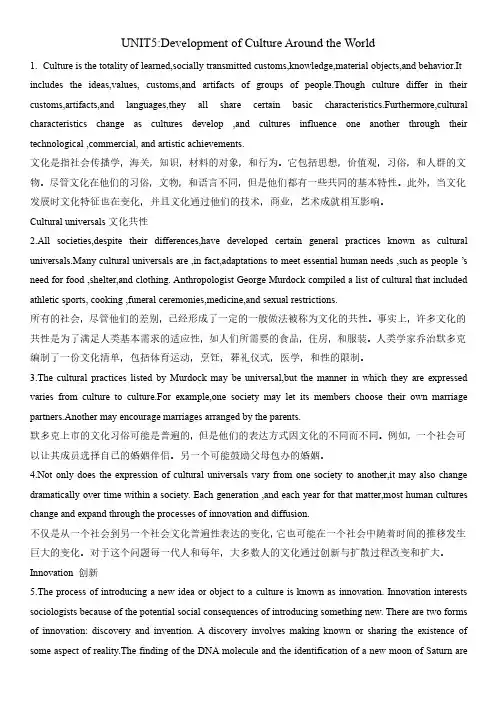
UNIT5:Development of Culture Around the World1.Culture is the totality of learned,socially transmitted customs,knowledge,material objects,and behavior.It includes the ideas,values,customs,and artifacts of groups of people.Though culture differ in their customs,artifacts,and languages,they all share certain basic characteristics.Furthermore,cultural characteristics change as cultures develop,and cultures influence one another through their technological,commercial,and artistic achievements.文化是指社会传播学,海关,知识,材料的对象,和行为。
它包括思想,价值观,习俗,和人群的文物。
尽管文化在他们的习俗,文物,和语言不同,但是他们都有一些共同的基本特性。
此外,当文化发展时文化特征也在变化,并且文化通过他们的技术,商业,艺术成就相互影响。
Cultural universals文化共性2.All societies,despite their differences,have developed certain general practices known as cultural universals.Many cultural universals are,in fact,adaptations to meet essential human needs,such as people’s need for food,shelter,and clothing.Anthropologist George Murdock compiled a list of cultural that included athletic sports,cooking,funeral ceremonies,medicine,and sexual restrictions.所有的社会,尽管他们的差别,已经形成了一定的一般做法被称为文化的共性。
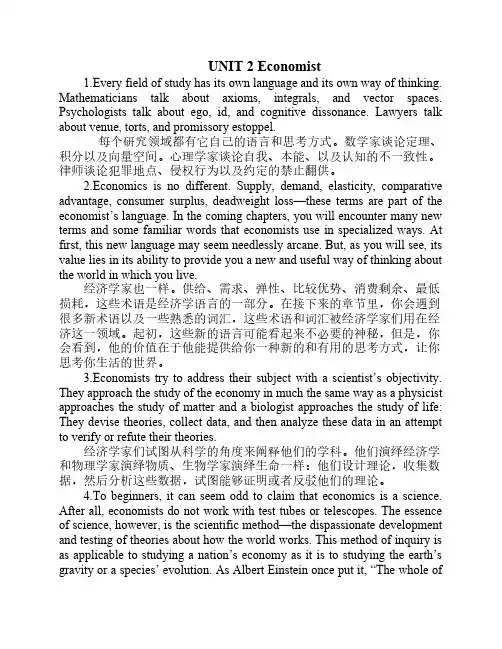
UNIT 2 Economist1.Every field of study has its own language and its own way of thinking. Mathematicians talk about axioms, integrals, and vector spaces. Psychologists talk about ego, id, and cognitive dissonance. Lawyers talk about venue, torts, and promissory estoppel.每个研究领域都有它自己的语言和思考方式。
数学家谈论定理、积分以及向量空间。
心理学家谈论自我、本能、以及认知的不一致性。
律师谈论犯罪地点、侵权行为以及约定的禁止翻供。
2.Economics is no different. Supply, demand, elasticity, comparative advantage, consumer surplus, deadweight loss—these terms are part of the economist’s language. In the coming chapters, you will encounter many new terms and some familiar words that economists use in specialized ways. At first, this new language may seem needlessly arcane. But, as you will see, its value lies in its ability to provide you a new and useful way of thinking about the world in which you live.经济学家也一样。

学术英语catation
学术英语(English for Academic Purposes,简称EAP)是指专门针对学术交流和论文写作的英语,其目的是帮助学者和研究人员在学术领域内更好地进行研究和交流。
学术英语涵盖了学术写作、学术演讲、学术阅读、学术听力等各个方面,是学者和研究人员必备的技能之一。
在学术英语中,catation是一个常见的术语,它指的是在学术论文中引用其他文献的一种方式。
Catation通常包括作者姓名、出版年份、引文内容和页码等信息,以便读者可以找到原始文献并进行进一步的深入研究。
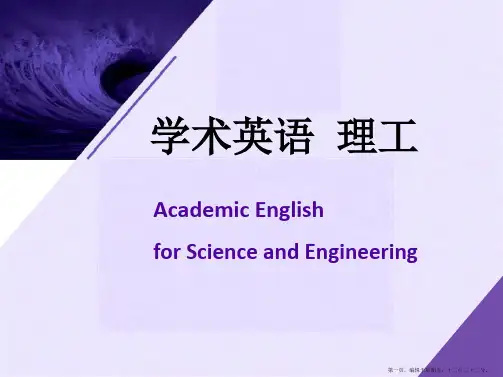
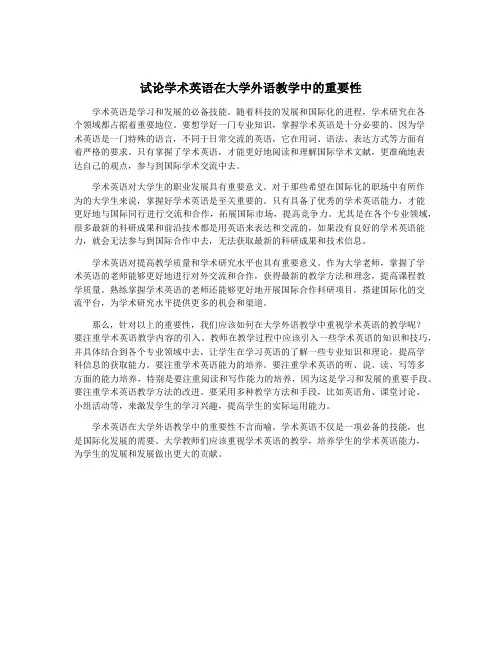
试论学术英语在大学外语教学中的重要性学术英语是学习和发展的必备技能。
随着科技的发展和国际化的进程,学术研究在各个领域都占据着重要地位。
要想学好一门专业知识,掌握学术英语是十分必要的。
因为学术英语是一门特殊的语言,不同于日常交流的英语,它在用词、语法、表达方式等方面有着严格的要求。
只有掌握了学术英语,才能更好地阅读和理解国际学术文献,更准确地表达自己的观点,参与到国际学术交流中去。
学术英语对大学生的职业发展具有重要意义。
对于那些希望在国际化的职场中有所作为的大学生来说,掌握好学术英语是至关重要的。
只有具备了优秀的学术英语能力,才能更好地与国际同行进行交流和合作,拓展国际市场,提高竞争力。
尤其是在各个专业领域,很多最新的科研成果和前沿技术都是用英语来表达和交流的,如果没有良好的学术英语能力,就会无法参与到国际合作中去,无法获取最新的科研成果和技术信息。
学术英语对提高教学质量和学术研究水平也具有重要意义。
作为大学老师,掌握了学术英语的老师能够更好地进行对外交流和合作,获得最新的教学方法和理念,提高课程教学质量。
熟练掌握学术英语的老师还能够更好地开展国际合作科研项目,搭建国际化的交流平台,为学术研究水平提供更多的机会和渠道。
那么,针对以上的重要性,我们应该如何在大学外语教学中重视学术英语的教学呢?要注重学术英语教学内容的引入。
教师在教学过程中应该引入一些学术英语的知识和技巧,并具体结合到各个专业领域中去,让学生在学习英语的了解一些专业知识和理论,提高学科信息的获取能力。
要注重学术英语能力的培养。
要注重学术英语的听、说、读、写等多方面的能力培养,特别是要注重阅读和写作能力的培养,因为这是学习和发展的重要手段。
要注重学术英语教学方法的改进。
要采用多种教学方法和手段,比如英语角、课堂讨论、小组活动等,来激发学生的学习兴趣,提高学生的实际运用能力。
学术英语在大学外语教学中的重要性不言而喻。
学术英语不仅是一项必备的技能,也是国际化发展的需要。
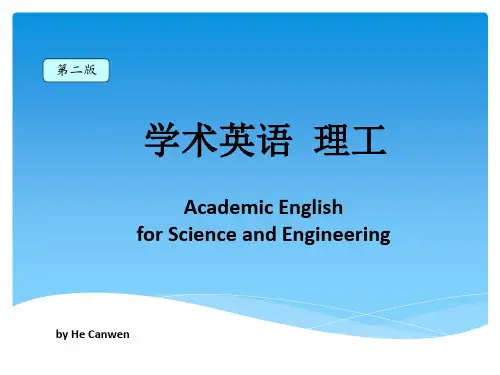
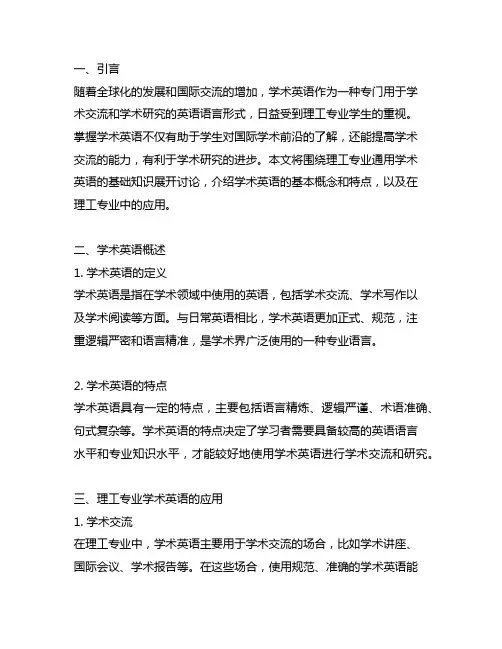
一、引言随着全球化的发展和国际交流的增加,学术英语作为一种专门用于学术交流和学术研究的英语语言形式,日益受到理工专业学生的重视。
掌握学术英语不仅有助于学生对国际学术前沿的了解,还能提高学术交流的能力,有利于学术研究的进步。
本文将围绕理工专业通用学术英语的基础知识展开讨论,介绍学术英语的基本概念和特点,以及在理工专业中的应用。
二、学术英语概述1. 学术英语的定义学术英语是指在学术领域中使用的英语,包括学术交流、学术写作以及学术阅读等方面。
与日常英语相比,学术英语更加正式、规范,注重逻辑严密和语言精准,是学术界广泛使用的一种专业语言。
2. 学术英语的特点学术英语具有一定的特点,主要包括语言精炼、逻辑严谨、术语准确、句式复杂等。
学术英语的特点决定了学习者需要具备较高的英语语言水平和专业知识水平,才能较好地使用学术英语进行学术交流和研究。
三、理工专业学术英语的应用1. 学术交流在理工专业中,学术英语主要用于学术交流的场合,比如学术讲座、国际会议、学术报告等。
在这些场合,使用规范、准确的学术英语能够更好地表达自己的观点和研究成果,与国际同行进行有效的交流。
2. 学术写作学术英语在理工专业中也广泛应用于学术论文、学术报告等的撰写。
学术写作需要具备严谨的逻辑思维能力和精准的语言表达能力,同时还需要掌握学术英语的句式结构和表达方式,才能够撰写出高质量的学术作品。
3. 学术阅读作为理工专业的学生,学术阅读是十分重要的技能。
在学术阅读过程中,学生需要理解并掌握学术英语中的专业术语、学术理论以及学术研究方法等内容,从而为自己的学术研究提供支持和参考。
四、学术英语的学习方法1. 词汇积累学术英语的词汇量相对较大,涉及到各个学科的专业术语和概念。
学生需要通过大量的阅读和学习,积累专业术语和表达方式,才能够熟练地运用学术英语进行学术交流和写作。
2. 句式结构学术英语的句式结构相对复杂,包括倒装句、定语从句、状语从句等。
学生需要通过大量的阅读和写作练习,熟练掌握学术英语的句式结构,从而能够准确、流畅地表达学术观点和研究成果。
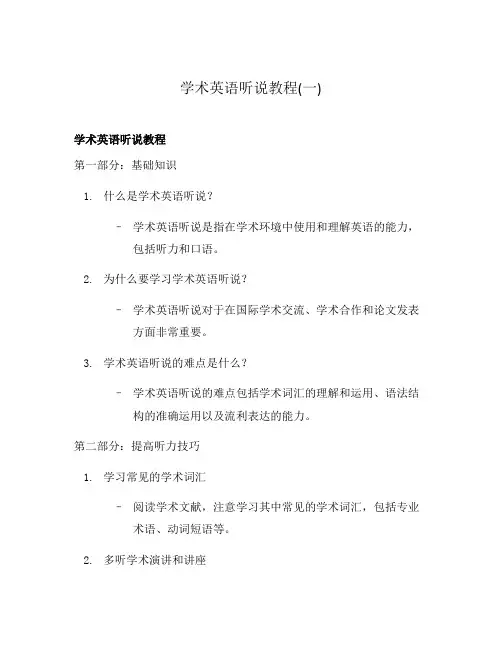
学术英语听说教程(一)学术英语听说教程第一部分:基础知识1.什么是学术英语听说?–学术英语听说是指在学术环境中使用和理解英语的能力,包括听力和口语。
2.为什么要学习学术英语听说?–学术英语听说对于在国际学术交流、学术合作和论文发表方面非常重要。
3.学术英语听说的难点是什么?–学术英语听说的难点包括学术词汇的理解和运用、语法结构的准确运用以及流利表达的能力。
第二部分:提高听力技巧1.学习常见的学术词汇–阅读学术文献,注意学习其中常见的学术词汇,包括专业术语、动词短语等。
2.多听学术演讲和讲座–找听力材料,如TED Talks、学术讲座等,提高对学术英语的听力理解能力。
3.使用辅助工具–利用字幕、语音识别等工具辅助听力训练,提高听力反应速度和理解能力。
第三部分:提高口语表达能力1.练习学术口语–参与学术讨论,主动发言,提高学术口语表达的能力。
2.视频录制与自我评估–使用录制设备录制口语表达,自我评估录音,发现问题并改进。
3.参加口语培训课程–参加学术口语培训课程,学习表达技巧和学术英语的正确运用。
第四部分:学术英语听说资源推荐1.学术英语听力资源–TED Talks: 提供各种学术话题的演讲,有字幕和英文字幕可供选择。
–Coursera: 提供大量学术课程,包括视频讲座和配套材料。
2.学术英语口语资源–Language Exchange: 寻找语言交换伙伴,进行口语交流练习。
–英语口语角: 参加当地的英语口语角,与他人进行英语口语交流。
以上是学术英语听说的基本教程和资源推荐。
希望能对你有所帮助,祝学习顺利!。
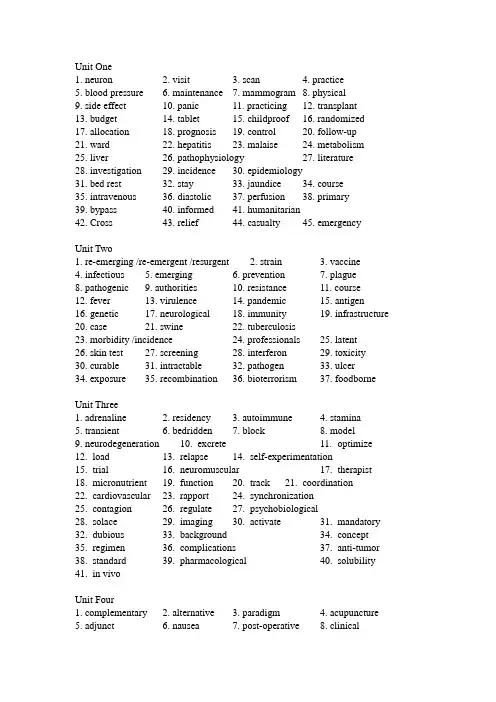
Unit One1. neuron2. visit3. scan4. practice5. blood pressure6. maintenance7. mammogram8. physical9. side effect 10. panic 11. practicing 12. transplant13. budget 14. tablet 15. childproof 16. randomized 17. allocation 18. prognosis 19. control 20. follow-up21. ward 22. hepatitis 23. malaise 24. metabolism 25. liver 26. pathophysiology 27. literature28. investigation 29. incidence 30. epidemiology31. bed rest 32. stay 33. jaundice 34. course35. intravenous 36. diastolic 37. perfusion 38. primary39. bypass 40. informed 41. humanitarian42. Cross 43. relief 44. casualty 45. emergencyUnit Two1. re-emerging /re-emergent /resurgent2. strain3. vaccine4. infectious5. emerging6. prevention7. plague8. pathogenic 9. authorities 10. resistance 11. course12. fever 13. virulence 14. pandemic 15. antigen 16. genetic 17. neurological 18. immunity 19. infrastructure 20. case 21. swine 22. tuberculosis23. morbidity /incidence 24. professionals 25. latent26. skin test 27. screening 28. interferon 29. toxicity 30. curable 31. intractable 32. pathogen 33. ulcer34. exposure 35. recombination 36. bioterrorism 37. foodborne Unit Three1. adrenaline2. residency3. autoimmune4. stamina5. transient6. bedridden7. block8. model9. neurodegeneration 10. excrete 11. optimize 12. load 13. relapse 14. self-experimentation15. trial 16. neuromuscular 17. therapist 18. micronutrient 19. function 20. track 21. coordination22. cardiovascular 23. rapport 24. synchronization25. contagion 26. regulate 27. psychobiological28. solace 29. imaging 30. activate 31. mandatory 32. dubious 33. background 34. concept 35. regimen 36. complications 37. anti-tumor 38. standard 39. pharmacological 40. solubility 41. in vivoUnit Four1. complementary2. alternative3. paradigm4. acupuncture5. adjunct6. nausea7. post-operative8. clinical9. physical 10. therapeutic 11. intervention 12. design13. resonance 14. emission 15. analgesia 16. establishment 17. rehabilitation 18. licensed 19. strategies 20. formulas21. array 22. integrative 23. acute 24. administer 25. procedure 26. evaluation 27. prevalence 28. conventional 29. evidence-based 30. management 31. peripheral 32. mechanisms 33. reductionistic 34. cost-effectiveness 35. outcomes36. preclinical 37. plausible 38. manipulative39. homeopathic 40. naturopathic 41. meditationUnit Five1. crisis2. symptoms3. vitality4. immune5. virus6. lifestyle7. robust8. fragile9. balance 10. spiritual 11. blockages 12. repressed13. genuine 14. psychological 15. integrated 16. decaying17. nutrition 18. waistline 19. bottled 20. intake21. appetite 22. protein 23. obesity 24. lean25. dietary 26. quality 27. dairy 28. diabetes29. contentUnit Six1. nursing2. hospice3. failure4. around-the-clock5. coronary6. respond7. facility8. end-of-life9. comfort 10. discharge 11. care 12. palliative13. fatal 14. pulmonary 15. experimental 16. advisors17. discontinue 18. dialysis 19. smear 20. provider21. care-as-usual 22. preventive 23. beaten 24. mold25. renew 26. fertilization 27. basic 28. stem cell29. collaborate 30. test-tube 31. reproductive 32. hormones 33. immature 34. empirical 35. pioneering 36. endoscope 37. ethical 38. concern 39. infertile 40. inherited41. fibrosis 42. dilemmasUnit Seven1. station2. life-support3. measures4. withdraw5. paternalistic6. empowerment7. ethicists8. principles9. ideal 10. patient-centered 11. autonomy12. options 13. exclusive 14. emergency 15. restraint16. anxiety 17. transgression 18. practice 19. metastases20. aggressive 21. primary 22. follow-up 23. record24. emboli 25. tomography 26. infiltrates 27. chest28. lower-lobe 29. labored 30. team 31. chronic32. psychosocial 33. guidelines 34. implementUnit Eight1. subject2. biomedical3. therapy4. protocol5. beneficence6. justice7. autonomous8. diminished9. exposed to 10. Oath 11. distribution 12. consent 13. procedures 14. operating 15. obligation 16. pediatric 17. perform 18. flow 19. intensive 20. adoptive 21. biological 22. psychological 23. medical 24. occupational 25. contract 26. infection 27. vessel 28. circulation 29. welfare 30. disapprove 31. protocol 32. liabilityUnit Nine1. curriculum2. community3. expectations4. attributes5. value6. maladies7. diagnostic8. manifestations9. civic mindedness 10. chatter 11. manner 12. directories 13. integral 14. underserved15. shortage 16. certification 17. address 18. basics19. teaching 20. academic 21. affiliate with22. continuing medical educationUnit Ten1. coverage2. Medicaid3. single-payer4. subsidize5. deliver6. duplicative7. sustained8. deficits9. echocardiogram 10. thrombus 11. stroke12. artery 13. intracranial 14. cerebral 15. bleeding 16. brain-stem 17. recovery 18. ventilation 19. anticoagulant 20. infusions 21. surgeon 22. administrators23. ambulances 24. elective 25. infarction 26. time-critical 27. arrest 28. traumatic 29. intervention 30. multi-payer 31. universal 32. for-profit 33. pharmaceutical34. remedies 35. out-of-pocket。
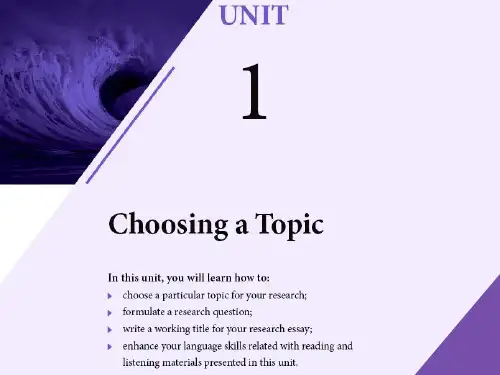
学术英语〔医学〕课后词组Unit11.overload神经过载2.a typical典型的诊所就诊3.DEXA DEXA扫描行医5. control血压控制6.health健康保持7. report乳房X线检查报告8. examination体检9. of a medication药物的副作用10.perpetual永久的恐慌11. physicians职业医生12. field移植领域13.medical医疗预算扑热息痛药片15. cap防孩子打开的盖子16. clinical trial随机临床试验17.Random随机分配18.patient病人的预后19. group对照组20.a10-year study10年的跟踪研究21.a medical内科病房传染性肝炎23.Severe身体严重不适24.bilirubin胆红素代谢damage永久的肝损伤加重病理生理状况27.Medical医学文献临床调查29. of relapse复发率临床流行病学严格的卧床休息32.hospital住院反复发作的黄疸34.clinical临床病程35 morphine静脉注射吗啡36 blood pressure舒张压大脑血灌输38. care初级保健39.aorto-coronary arterial 主动脉冠状动脉旁路40. treatment decision知情治疗决41.an international group 一个国际人道组织42.the Red红十字会43.The first major effort第一次重大援助工作44 of war战争中的人员伤亡45. relief efforts紧急援助、Unit21 disease(再现疾病)2.new flu新流感变种3.antibiotics and抗生素和疫苗4. disease传染病5 disease新现疾病6 strategy预防策略7.bubonic腺鼠疫8. microbes病原微生物9.public heath 公共卫生机构抗药性of antibiotic therapy抗生素治疗疗程猩红热13.the level of 毒性水平14.flu流感大流行15.surface外表抗原16. shift基因改变神经性并发症18.waning of 免疫力减弱19.public health公共卫生基础设施20.a malaria一个疟疾病例21. flu猪流感22. bacillus结核杆菌of morbidity发病率水平24.health保健专业人士25 tuberculosis潜伏结核病结核素皮试27. programmes筛查计划28. gamma testsγ干扰素测试29.drug药物毒性30.an disease一种可治愈的病31, infectious disease难治的传染病32.an unknown一种未知的病原体33.chronic gastric 慢性胃溃疡34 to carries of disease接触带病者35,genetic基因重组36.agent of 生物恐怖活动病原37. infections通过食物传播的传染病Unit31.the surge of肾上腺素激增2.an internal medicine 内科实习期disease自体免疫4.loss of丧失持久力5. weakness短暂的虚弱6.becoming卧床不起7.a building基本构件8.an animal动物模型9.to slow 减缓神经退化10.to toxins排除毒素11.to nutrition优化营养毒素载量13.the risk of复发危险14.physician医生自我实验15.a clinical 临床试验16. electrical stimulation神经肌肉电刺激理疗师18.the impact of微量营养素的影响19.brain脑功能2 the emotional flow跟踪情绪波动21 of emotions情绪协调22. reactions心血管反应23.feeling of t亲密感觉情绪传染27.a生物心理单元28.emotional情感慰藉resonance 功能性磁共振成像30.to brain zones激活该脑部区域31.to make it使之成为强制性project无把握的项目33.medical background医学背景4.proof of概念验证35.dose剂量方案36. or concomitant conditions 并发症与合并症37 agents抗肿瘤的药剂标准疗法39. properties药理学特性溶解性差41. pharmacology体内药理学Unit41.medicine补充医学2. medicine替代医学3.a medical医疗模式4. and herbs针灸和草药treatment辅助治疗6. a and vomiting恶心,呕吐7. dental pain术后牙痛. trials临床试验9. therapy物理疗法,理疗10 modalities治疗方法11.a therapeutic治疗干预12.Research design研究设计13.magnetic e磁共振tomography正电子发射型电脑断层成像15 effect止痛效果16.biomedical生物医学界17. unit康复中心18. acupuncturist持照针灸师19.therapeutic治疗策略20.herbal草药配方21.a wide array of各式各样的并发症22. East-West medicine中西医结合23. abdominal pain急性腹痛24.to medicines施药,用药25.surgical外科手术26.scientific科学评估27. statistics患病率统计prevalence28. therapies传统疗法29. models of care询证医学模式30.stress压力处理31 nervous system周围神经系统.peripheral32.physiologic生理机制33.mechanistic and studies 机制和复原式研究34. research效益研究35.clinical临床结果36. and clinical studies临床前及临床研究37 mechanisms可能的机制38 therapies推拿治疗39. medicine顺势疗法40. medicine自然疗法41. and yoga冥想与瑜伽Unit51.a health健康危机2.physical s身体症状3.Energy and能量和活力4.be completely I from sth.对某事完全免疫5. of falseness虚假的病毒6.stressful有压力的生活方式7. t emotion健全的感情8. health脆弱的健康9.to our mind,body and spirit平衡心理、身体和精神10. life精神生活11.the to wellness通向身心健康的“路障”12. emotions被压抑的感情13. feelings and emotion真情实感14. l influences心理影响human beings十全十美的人16. teeth蛀牙17 professor营养教授18.burgeoning迅速膨胀的腰围19. water瓶装水20.caloric热量摄入21.to curb节制食欲22.grains and谷物和蛋白质儿童肥胖症24 protein精益蛋白质25. habits饮食习惯26. of life生活质量27. category乳制品类28.prevention of 糖尿病的预防29.sodium钠的含量Unit61. homes养老院2 care临终关心3.congestive heart充血性心衰24小时随叫随到5 care unit冠心病监护室6.to to treatment对治疗有反应7.skilled nursing专业护理机构8. care生命终末期护理9. care舒适护理10.hospital planner出院计划专员11 care症状护理12 care姑息疗法13. illness绝症14.chronic obstructive disease慢性阻塞性肺病15. treatments实验性治疗16.spiritual精神参谋17.to all treatment终止所有治疗18.to go through经历透析19.A PAP 巴氏涂片检查relationship医患关系21.to provide 提供常规医护22. examinations预防性检查23.off the path离开熟路,另辟蹊径24.to into a shape塑形25.To a prescription照旧处方再开药26.in vitro体外受精27. biology基础生物学research胚胎干细胞研究29.to with an outside与圈外人合作baby试管婴儿31. sciences生殖科学32.to administer施用激素33.to isolate eggs别离未成熟卵子34. observations经验观察35. work首创研究36.a fibre-optic光导纤维内窥镜37. guidelines伦理原则38.societal社会关注39. couples不孕不育夫妇40. disease遗传疾病囊泡性纤维症42.ethical伦理困境Unit71.a nursing护士站2. machines生命维持系统3 fort 舒适护理措施4.to treatments停止治疗5. decision-making process家长式决策程序6.patient给病人授权7.medical医学伦理学家伦理准则9.clinical临床理念10. care以病人为中心的护理11.patient病人自主权12.treatment治疗选择13. purview专属领域14. decisions紧急状况下做的决定15.physician对医生的限制16. and confusion焦虑与困惑17.ethical违背伦理18.family家庭医疗19.widespread广泛转移20. treatment积极治疗21 lesion原发病灶22.to recommend 建议随访23.electronic电子病历24.pulmonary肺栓塞25 puterized电脑断层扫描CT双侧浸润27.a X-ray X线胸片28.left pneumonia左下肺叶肺炎29. breathing呼吸困难30.the hospice临终关心团队31. illness慢性病32 aspects社会心理学领域33.evidence-based循证临床指南a plan of care实施治疗方案Unit81.human人体研究对象2. research生物医学研究3.accepted公认的治疗4.a formal正式方案5.the principle of有利原则6.the principle of公正原则7. agents有自主能力的行为者8. autonomy自主性减弱9.be risk of harm使……面临受害危险10.Hippocratic希波克拉底誓言11.fairness in分配的公正性rmed知情同意13.fair and outcomes公正的程序和结果14.the table手术台15.an ethical伦理责任16.a neurosurgeon儿科神经外科医生pediatric17.to the surgery做手术血流19. care重症监护20. father义父21. father生父22. needs心理需要23. judgment医学判断24. therapy职业疗法25.to meningitis感染脑膜炎26.to die of an 死于感染27.blood血管28.imbalances in循环的不平衡29.the of human research subjects人类研究对象的安宁30.to approve or all research activit ies批准或不批准所有的研究活动31.to review a审查一个研究计划32.at risk of civil or criminal有民事或刑事责任的危险参考答案Unit 11. neuron 神经2. office visit(诊所)就诊3. scan 扫描4. medical practice 行医5. blood pressure 血压6. maintenance(健康)保持7. mammogram 乳房X线8. physical 身体9. side effect 副作用10. panic 恐慌11. practicing 执业12. transplant 移植13. budget 预算14. tablet 药片15. childproof 防孩子16. randomized 随机17. allocation(随机)分配18. prognosis 预后19. control 对照20. follow-up 跟踪21. ward 病房22. hepatitis 肝炎23. malaise 身体不适24. metabolism 代谢肝26.pathophysiology 病理生理27. literature 文献28. investigation 调查29. incidence 率30. epidemiology 流行病学31. bed rest 卧床休息32. hospital stay 住院33. jaundice 黄疸34. course 病程35. intravenous 静脉注射36. diastolic 舒张37. perfusion 灌注38. primary 初级39. bypass(冠脉)旁路40. informed 知情41. humanitarian 人道主义42. the Red Cross 红十字会43. relief 援助44. casualty 人员伤亡45. emergency 紧急Unit 21. re-emerging 再现2. strain 变种3. vaccine 疫苗4. infectious 传染性的5. emerging 新出现6. prevention 预防7. plague 鼠疫8. pathogenic 病原的9. authorities 机构10. drug resistanc 抗药性11. course 疗程12. scarlet fever 猩红热13. virulence 毒性14. pandemic 大流行15. antigen 抗原16. genetic 基因的17. neurological 神经性18. immunity 免疫力19. infrastructure 基础设施20. case 病例21. swine 猪22. tuberculosis 结核23. morbidity/incidence 发病率24. professionals 专业人士25. latent 潜伏26. skin test 皮试27. screening 筛查28. interferon 干扰素29. toxicity 毒性30. curable 可治愈的31. intractable 难治的32. pathogen 病原体33. ulcer 溃疡34. exposure 接触(带病者)35. recombination 重组36. bioterrorism 生物恐怖活动37. foodborne 生物传播Unit 31. adrenaline 肾上腺素2. residency 实习3. autoimmune 自身免疫4. stamina 持久力5. transient 短暂的6. bedridden 卧床不起7. building block 基本构件8. model 模型9. neurodegeneration 神经退化10.excrete 排除(毒素)11.optimize 优化12.load 载量13.relapse 复发14.self-experimentation 自我实验15.trial 试验16.neuromuscular 神经肌肉17.therapist 治疗师微量营养素19.function 功能20.track 跟踪21.coordination 协调22.cardiovascular 心血管23.rapport 亲密24.synchronization 同步25.contagion 传染26.regulate 调节生物心理28.solace 慰藉29.imaging MRI30.activate 激活31.mandatory 强制性32.dubious 无把握的33.background 背景34.concept 概念35.regimen 方案36plications 并发症37.anti-tumor 抗肿瘤38.standard标准的39.pharmacological 药理学的40.solubility 溶解性41.in vivo 体内Unit 41. complementary 补充2. alternative 替代(医学)3. paradigm 模式4. acupuncture 针灸5. adjunct 辅助6. nausea 恶心7. post-operative 术后8. clinical 临床的9. physical therapy 理疗10. therapeutic 治疗(方法)11. intervention 干预12. design 设计13. resonance 共振14. emission 发射PET15. analgesia 止痛16. establishment(生物医学)界17. rehabilitation 康复18. licensed 持照(针灸师)19. strategies 策略20. formulas 配方21. wide array 各式各样的22. integrative(中西医)结合23. acute 急性的24. administer 给药25. procedure 程序26. evaluation 评估27. prevalence 患病率28. conventional 传统(疗法)29. evidence-based 循证的30. management(压力)处理31. peripheral 外周/外围32. mechanisms 机制33. reductionistic 复原式的34.cost-effectiveness 效益35. outcomes 结果36. preclinical 临床前37. plausible 可能的38. manipulative 推拿39. homeopathic 顺势40. naturopathic 自然(疗法)41. meditation 冥想Unit 51. crisis 危机2. symptoms 症状3. vitality 活力4. immune 免疫5. virus 病毒6. lifestyle 生活方式7. robust 健全的8. fragile 脆弱的9. balance 平衡10. spiritual 精神的11. blockages 路障12. repressed 被压抑的13. genuine 真实的(真情实感)14. physiological 心理15. integrated 整合的(十全十美)16. decaying teeth 蛀牙17. nutrition 营养18. waistline 腰围19. bottled 瓶装(水)20. intake 摄入21. appetite 食欲22. protein 蛋白质23. obesity 肥胖症24. lean 精益的(蛋白质)25. dietary 饮食(习惯)26. quality 质量27. dairy 乳制品28. diabetes 糖尿病29. content 含量Unit 61. nursing home 养老院2. hospice 临终(关心)3. failure(心)衰4.available around-the-clock24小时随叫随到5. coronary 冠心病6. respond(对治疗有)反应7. facility 机构8. end-of-life 终末期9. comfort 舒适的(护理)10. hospital discharge 出院11. care(症状)护理12. palliative 姑息的13. fatal illness 绝症14. pulmonary 肺的COPD15. experimental 实验性的16. advisors 参谋17. discontinue 终止18. dialysis 透析19. smear 涂片20. provider 医患关系21. care-as-usual 常规医护22. preventive 预防性23. beaten 常用的off thebeaten path 离开熟路,另辟蹊径24. mold into the shape 塑形25. renew 重新开始torenew a prescription 照旧处方再开药26. fertilization 授精27. basic 基础的(生物学)28. stem cell 干细胞29. collaborate 合作30. test-tube 试管(婴儿)31. reproductive 生殖的32. hormones 激素33. immature 未成熟的34. empirical 经验(观察)35. pioneering 首创的36. endoscope 内镜37. ethical 伦理的38. concern(社会)关注39. infertile 不孕不育的40. inherited 遗传性的41. fibrosis 纤维化42. dilemmas 困境Unit 71. station(护士)站2. life-support 生命维持(系统)3. measures 护理措施4. withdraw 停止(治疗)5. paternalistic 家长式的6. empowerment 授权7. ethicists 伦理学家8. principles 准则9. ideal 理念10.patient-centered 以病人为中心的11. autonomy 自主权12. options 选择13. exclusive purview 专属的(领域)14. emergency 紧急(决定)15. restraint 限制16. anxiety 焦虑17. transgression 违背18. practice(家庭)医疗19. metastases(广泛)转移20. aggressive 积极的21. primary 原发22. follow-up 随访23. record 病历24. embolism 栓塞25. tomography 断层摄像CT26. infiltrates 浸润27. chest 胸28. lower-lobe 左下叶29. labored(呼吸)困难30. team 团队31. chronic 慢性的32. psychosocial 社会心理33. guidelines 指南34. implement 实施(治疗方案)Unit 1 动脉旁路1.neuron overload 神经过载2.a typical office visit 典型的诊所就诊3.DEXA scan DEXA扫描4.medical practicing 行医5.blood pressure control 血压控制6.health maintenance 健康保持7.Mammogram report 乳房X线检查报告8.physical examination 体检9.side effect of a medication药物的副作用10.perpetual panic 永久的恐慌11.practicing physicians 职业医生12.transplant field 移植领域13.medical budget 医疗预算14.paracetamol tablet 扑热息痛药片15.childproof cap 防孩子打开的盖子16.randomized clinical trial随机临床试验17.Random allocation 随机分配18.patient prognosis 病人的预后19.control group 对照组20.a 10-year follow-up study10年的跟踪研究21.a medical ward 内科病房22.infectious hepatitis 传染性肝炎23.Severe malaise 身体严重不适24.bilirubin metabolism 胆红素代谢25.permanent liver damage永久的肝损伤26.exacerbatepathophysiology 加重病理生理状况27.Medical literature 医学文献28.clinical investigation 临床调查29.incedence of relapse 复发率30.clinical epidemiology 临床流行病学31.strict bed rest 严格的卧床休息32.hospital stay 住院33.recurrent jaundice 反复发作的黄疸34.clinical course 临床病程35.intravenous morphine 静脉注射吗啡36.diastolic blood pressure舒张压37.brain perfusion 大脑血灌输38.primary care初级保健39.aorto-coronary arterialbypass主动脉冠状助工作rmed treatmentdecision 知情治疗决41.an internationalhumanitarian group一个国际人道组织42.the Red Cross 红十字会43.The first major reliefeffort 第一次重大援44.casualty of war 战争中的人员伤亡45.emergency relief efforts紧急援助Unit 31.the surge of adrenaline 肾上腺素激增2.an internal medicineresidency 内科实习期3.an autoimmune disease自体免疫4.loss of stamina 丧失持久力5.transient weakness 短暂的虚弱6.becoming bedridden 卧床不起7.a building block基本构件8.an animal model 动物模型9.to slow neurodegeneration 减缓神经退化10.to excrete toxins排除毒素11.to optimize nutrition 优化营养12.toxic load毒素载量13.the risk of relapse 复发危险14.physician self-experimentation医生自我实验15.a clinical trial 临床试验16.neuromuscular electrical stimulation 神经肌肉电刺激17.physical therapist 理疗师18.the impact of micronutrients 微量营养素的影响19.brain function 脑功能20.track the emotional flow 跟踪情绪波动21.coordination of emotions 情绪协调22.cardiovascular reactions 心血管反应23.feeling of rapport 亲密感觉24.rapid entrain 迅速同步25.emotional contagion 情绪传染26.to mutually regulation 互相调节27.a psychobiological unit生物心理单元28.emotional solace情感慰藉29.functional magneticresonance imaging功能性磁共振成像30.to activate brain zones激活该脑部区域31.to make it mandatory 使之成为强制性32.a(n) dubious project无把握的项目33.medical background医学背景34.proof of concept概念验证35.dose regimen 剂量方案36 plications orconcomitant conditions并发症与合并症37.anti-tumor agents 抗肿瘤的药剂38.standard therapy标准疗法39.pharmacology properties药理学特性40.poor solubility 溶解性差41.in vivo pharmacology 体内药理学Unit 51.a health crisis 健康危机2.physical symptoms 身体症状3.Energy and vitality 能量和活力4.be completely immunefrom sth.对某事完全免疫5.virus of falseness 虚假的病毒6.stressful lifestyle 有压力的生活方式7.robust emotion 健全的感情8.fragile health 脆弱的健康9.to balance our mind ,bodyand spirit平衡心理、身体和精神10.spiritual life精神生活11.the blockage to wellness通向身心健康的“路障”12.repressed emotions 被压抑的感情13.genuine feelings andemotion真情实感14.physiological influences心理影响15.fully integrated humanbeings 十全十美的人16.decaying teeth 蛀牙17.nutrition professor 营养教授18.burgeoning waistline 迅速膨胀的腰围19.bottled water 瓶装水20.caloric intake 热量摄入21.to curb appetite 节制食欲22.grains and protein 谷物和蛋白质23.childhood obesity 儿童肥胖症24.lean protein 精益蛋白质25.dietary habits 饮食习惯26.quality of life 生活质量27.diary category 乳制品类28.prevention of diabetes糖尿病的预防29.sodium content 钠的含量Unit 71.a nursing station 护士站2.life-support machines 生命维持系统3 fort measures 舒适护理措施4.to withdraw treatments停止治疗5.paternalistic decision-making process 家长式决策程序6.patient empowerment 给病人授权7.medical ethicists 医学伦理学家8.ethical principles 伦理准则9.clinical ideal 临床理念10.patient-centered care 以病人为中心的护理11.patient autonomy 病人自主权12.treatment options 治疗选择13.exclusive purview 专属领域14.emergency decisions 紧急状况下做的决定15.physician restraint 对医生的限制16.anxiety and confusion 焦虑与困惑17.ethical transgression 违背伦理18.family practice 家庭医疗19.widespread metastases 广泛转移20.aggressive treatment 积极治疗21.primary lesion 原发病灶22.to recommend follow-up 建议随访23.electronic record 电子病历24.pulmonary embolism 肺栓塞25 puterized tomography CT,电脑断层扫描26.bilateral infiltrates双侧浸润27.a(n) chest X-ray(X线胸片)28.left lower-lobe pneumonia左下肺叶肺炎borcd breathing呼吸困难30.the hospice team临终关心团队31.chronic illness慢性病32.psychosocial aspects 社会心理学领域33.evidence-based guidelines 循证临床指南34.to implement a plan of care 实施治疗方案。
《学术英语》课程作业——摘要学号:5901212164 姓名:帅彪专业班级:材成123班
(基于Text 5 Can You Compete with A.I. for the Next Job ?)
Abstract
With the development of social and technology, Artificial intelligence may replace human jobs in the future. There are a lot of news that reported Artificial intelligence has play a important role in our life. For decades. People wrote about how machines replace humans. It will be better or ill. But all expected did not come. Around the time of the Revolution. Most of Americans worked in the farm. They farmed to keep themselves alive. With the development of traffic. Farming increasingly became a cash business. But as the agricultural industry grew, there are fewer and fewer workers who worked at farming and ranching. Today agricultural provides fewer than two million jobs. Because of automation happened. It bring better plows, planting and sowing machines. Agricultural become more and more scientific. The farmers’ children found new kinds of jobs in the city, they do not like stay on the farm. The early water-and-steam-powered factories also displace millions of craftsmen, because machine-handing factory workers made the goods better than the goods made by craftsmen. So that the number of factory jobs growing rapidly at that time. The automation of farming, craft work and manufacturing made products. Among them, food become more and
more cheaper, so people can save money from food, then spend money on other expensive goods. Will A.I. machines take over the best occupations? The author is optimist and may not agree that machines will replace human jobs.
摘要
随着社会和科技的发展,人工智能可能在未来取代人类工作。
有很多的新闻报道,人工智能已经在我们的生活中起重要的作用。
几十年来。
人们写了如何用机器代替人工作。
这将会带来好处还是坏处,但都没有实现。
在美国独立战争时期。
大多数的美国人在农场工作。
他们靠耕种维持自己的生活。
随着交通的发展。
农业越来越走向市场。
但是,随着农业工厂化的崛起,越来越少的人在农场牧场工作。
今天的农业提供了少于二百万的工作。
由于农业自动化的发展。
它带来更好的犁,种植、播种机。
农业变得越来越科学。
但是农民们的孩子更愿意在城市找工作,他们不喜欢呆在农场。
早期的水和蒸汽动力工厂也取代成千上万的工匠,因为机械制造厂工人制造的商品比手工制作的商品更好。
所以工厂的就业率迅速增加。
农业自动化,工艺和制造业生产的商品。
其中,食物变得越来越便宜,所以人们可以从买食物中节省金钱,然后有足够的钱去消费那些昂贵的物品。
人工智能机器将来会不会接管最好的职业?作者是乐观主义者,可能不会同意机器将代替人类的工作。